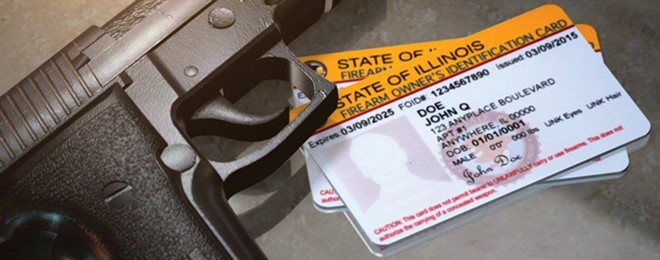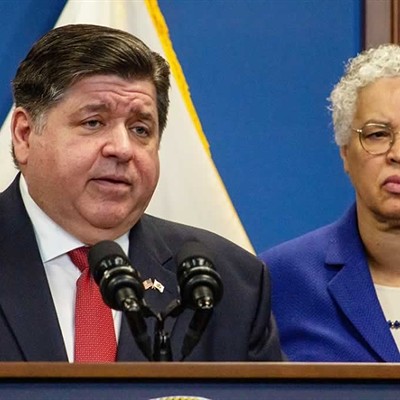It could be a court case that expands Illinois gun-owner rights, but the state Supreme Court has twice avoided making a decision.
At issue is whether the Illinois Firearm Owners Identification Card, or FOID, is an unconstitutional infringement on a citizen's right to bear arms.
"Whenever the court can rule on an issue without having to get into the Second Amendment constitutional issue, they will dodge, they will punt," said Todd Vandermyde, the retired, longtime Statehouse lobbyist for the National Rifle Association.
The four Democrats on the high court kicked the case back to the trial court, while the court's three Republicans joined in dissent.
It was the second time the case of the People v. Vivian Brown came before the court and the second time the court declined to rule on the constitutionality of the state statute requiring Illinoisans to receive a permit to legally own a gun.
Vivian Brown is a cancer patient living near Carmi in deep southern Illinois, said Richard Pearson, president of the Illinois Rifle Association. She kept a bolt-action, single shot .22 caliber rifle in her home for her personal protection, he added.
Brown's estranged husband reported to the police that she had fired the rifle in the house. Police officers responding to her home could find no evidence that a gun had had been fired. But she was charged with possessing a firearm without a FOID card, and her rifle was confiscated.
Brown maintained in her court filing that requiring her to go through the FOID card process unconstitutionally infringed upon her fundamental right of self-defense in the privacy of her own home. And the trial court agreed, ruling the statute unconstitutional.
In 2020, the state Supreme Court kicked the case back to the trial court on a technicality. But when the case returned to White County, another trial judge again ruled the entire act unconstitutional. And again, this month the high court kicked it back to the trial court, saying its instructions had not been abided by.
"They sidestepped the issue. And why do you reckon they want to sidestep the issue? Because they don't want to rule on it because they know what the ruling should be. In the home, at the very least, it's unconstitutional to require a FOID to possess a gun," Pearson, of the state rifle association, said.
Republicans on the high court were critical of the Democratic majority's ruling. Justice Michael Burke said in his dissent Brown was never acquitted of the criminal charge. Rather, she only "obtained a dismissal on what she considered dubious legal grounds that she had never argued."
He predicted the case will return to the high court a third time and the state Supreme Court will ultimately have to rule on the constitutionality of the state gun permit law.
Vandermyde, formerly of the NRA, noted that citizens aren't required to obtain a permit to exercise such First Amendment rights as attending church or expressing a political point of view. He asked: Why should a license be required to exercise a Second Amendment right?
But Esther Sanchez-Lopez, a lawyer for the Gifford Law Center to Prevent Gun Violence, said sometimes a license is required to practice a constitutional right. For example, she noted sometimes permits are required for public demonstrations.
"And unlike attending church, guns kill people. It's a very different exercise of a right than some others," she said. "I do think it is constitutional. I think that the FOID imposes a minimal burden on law-abiding citizens. And the reality is the FOID card act really just creates a process by which someone confirms that they are eligible to possess the firearm. It's a relatively minimal burden."
White County resident Judge T. Scott Webb ruled, "Even though the Supreme Court left open the option of regulation to combat the dangers of gun violence in Heller, it is this court's opinion that the FOID Card Act goes too far... This act makes criminals out of law-abiding citizens who are attempting to protect their lives within their homes."
Webb cited "fees" associated with the FOID card, noting, "Any fee associated with exercising the core fundamental constitutional right of armed self-defense within the confines of one's home violates the Second Amendment."
It costs $10 to apply for a FOID card, and if it is issued, it is valid for 10 years.
While on the surface the case would seem to be between Vivian Brown and the local prosecutor, it actually is much more complex. The Illinois State Rifle Association and the Second Amendment Foundation out of the state of Washington are bankrolling her defense in hopes of establishing a legal precedent broadening gun-owner rights, Pearson said. And the Gifford Law Center and other gun-control groups wrote amicus, or friends of court, briefs in favor of licensing gun owners.
Scott Reeder, a staff writer for the Illinois Times, can be reached at [email protected]





















